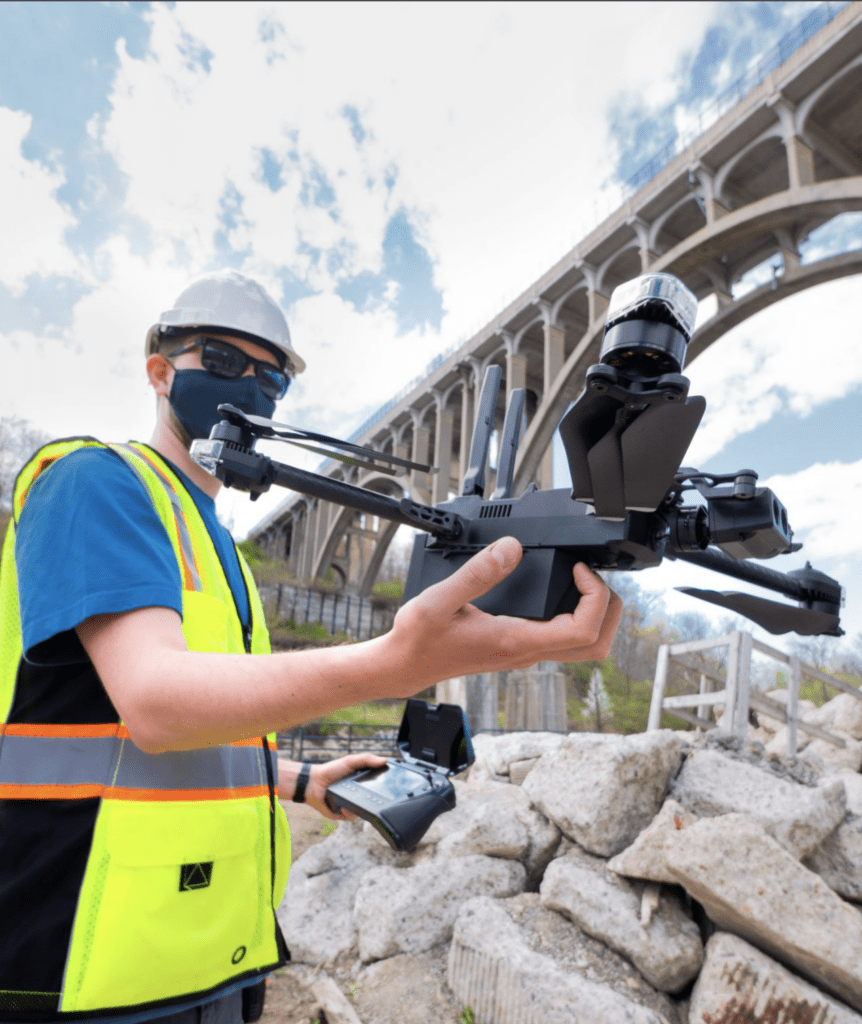
Skydio now offers services to help customers document their BVLOS drone program and apply for waivers from the FAA. (Photo: Skydio)
Today, U.S. drone manufacturer Skydio introduced a new offering—Skydio Regulatory Services—for its customers. Skydio’s regulatory team will partner with organizations to work through the necessary documentation and waiver applications to enable autonomous drone operations.
Skydio’s team focuses heavily on cybersecurity and supply chain security, and the company has established a partnership with the Department of Defense based on those advantages. The team has also developed a deep understanding of the Federal Aviation Administration’s regulations for drones.
Jenn Player, Senior Director of Regulatory Affairs at Skydio, has been involved in enabling beyond visual line of sight (BVLOS) drone operations for more than 10 years. “I’ve helped numerous enterprise UAS programs win regulatory approvals for advanced operations,” she shared during a webinar hosted by AUVSI last week.
Player has also participated in task groups for the Drone Advisory Committee (now called the Advanced Aviation Advisory Committee), and recently led an industry working group within the FAA’s BVLOS Aviation Rulemaking Committee.
She shared that their focus is helping customers to be more productive and safe in their drone operations. Many customers need to be able to fly BVLOS to accomplish their objectives. “For now, the only way to fly BVLOS is through waivers and sometimes exemptions to the Part 107 drone regulations,” she stated.

Skydio’s waiver application packages include the Pathfinder service for enabling ground-breaking autonomous BVLOS operations. (Photo: Skydio)
Product Marketing Manager Sean Nordstrom explained during the webinar that many of today’s use cases for drones are still limited by manual hardware. “We’re moving into the age of AI-driven autonomy,” he stated. “Manual drones struggle to operate in and below structures—for example, under bridges—where GPS is denied.
“When that GPS data is inaccessible, operators are more focused on not crashing the drone than they are at achieving the task at hand. Manual drones are also costly, often requiring large systems, expensive payloads, and highly skilled pilots to capture imagery or video from a safe location.”
In contrast, Skydio’s drones are autonomous and software-driven. The drones build maps of their surroundings in real time using 3D Scan technology. They can autonomously predict upcoming obstacles and avoid them. This enables automation of complex workflows such as data capture, remarked Nordstrom.

“There’s a BVLOS barrier between stages two and three. We have to break down that barrier together with our partners and customers, and working with the FAA, taking a ‘crawl, walk, run’ approach.” – Jenn Player, Sr. Director of Regulatory Affairs (Photo: Skydio)
“The regulatory team at Skydio wants to unlock the full potential of autonomy-enabled operations from the ground up, using a phased approach, to get approvals for complex operations that go beyond Part 107 regulations,” Player explained.
She stressed the importance of making the safety case for using Skydio’s drones in high-value real-world operations. For many of those applications, the drone can be flown just beyond the visual line of sight, she noted, at relatively short distances, and at low altitudes. “That type of BVLOS operation has tremendous utility, but it can also do a lot to reduce ground and air risk.”
Jakee Stoltz, Senior Regulatory Program Manager at Skydio, explained that their new Waiver Application service was developed to help organizations obtain the necessary FAA approval for conducting advanced operations. “We work with you to understand the type of operation that you want to do, what your drone program looks like, and how it’s structured,” he said. “Then we’ll create that documentation package to submit to the FAA for that request.”
A documentation package can include a concept of operations, technical data, and a safety risk assessment, along with other information. Skydio’s regulatory experts provide support while the FAA is reviewing an application in case there are requests for further information.
“We have a lot of experience doing these waivers,” Stoltz noted. “There’s often a lot of synergy between how your drone program is structured and the policies in place that govern your program. It’s common for us to assist organizations in reviewing manuals to make sure they have the components that the FAA expects of an advanced program.”